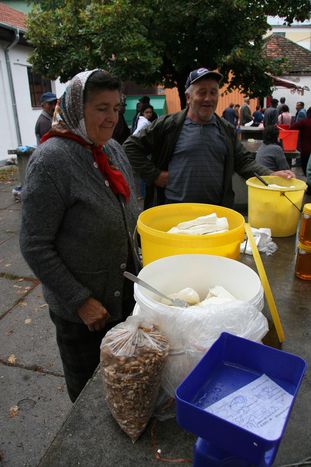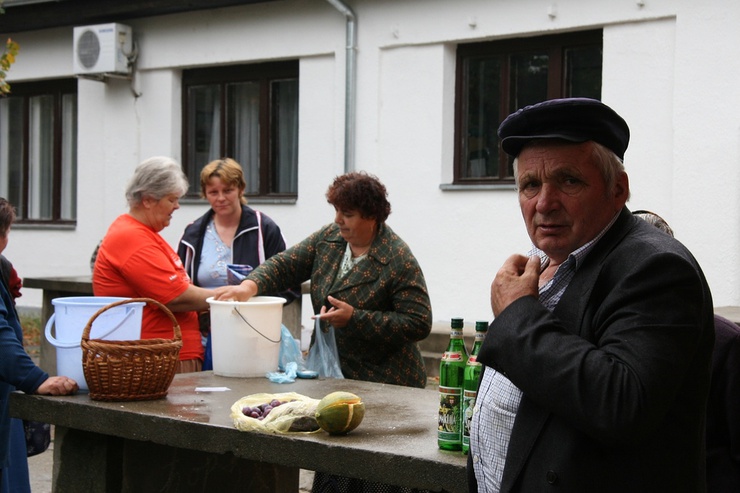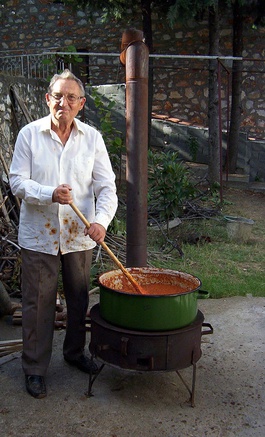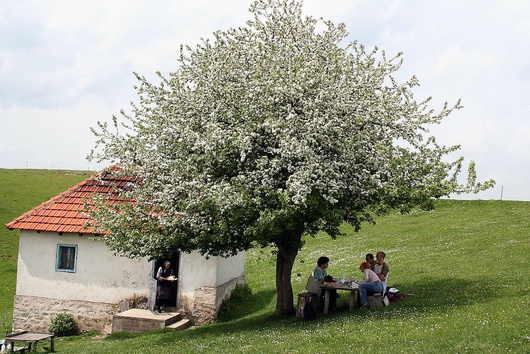
Serbia farmers markets in the new Brussels system
Published on
Translation by:
 Media Consulta
Media Consulta
Rather than freezing to death in the markets, farmers from Serbia will sell the greater part of their produce in supermarkets, and homemade cheese, kajmak, ajvar, tursija, bacon, honey and slatko will be wrapped up in appealing packages labelled ‘when we join the EU’
An ever-increasing cold nips at Belgrade’s Bajlonijev market, where there are more sellers than buyers. Forty-eight year old Nikola Pantovic jumps nimbly up and down behind his stall, warming his roughened hands with own breath. It is already midday, and nearly all the potatoes, onions and apples remain unsold. Pineapple-shaped apples, as well as those knobbled and miniscule like ‘rotting plums’ are already frozen through.
Nevertheless, if agricultural experts are to be believed, as the implementation of European standards in Serbia advances, so will the chance for Pantovic and other ‘small-producers’ from villages to become ‘gentry’. Rather than freeze to death in markets and wait for buyers in trepidation, farmers from Serbia will sell most of their produce to supermarkets. Homemade cheese, kajmak, ajvar, tursija, bacon, honey and slatko will reach the shelves of the shops rather than market stalls, wrapped up in eye-pleasing packages complete with labels. And just because our farmer will have less worry about marketing his produce, it could therefore spell the end for most of the markets, at least as we know them today.
Cheese, kajmak, tursija

Even though the spectacle of little pigs being sold from car boots is not so commonplace now, sale of livestock will face additional controls. On the rural farms, rakija will continue to be distilled for personal use at will, but for its entry into the legal market a label will be necessary. All those wishing to try their hand at the production of this drink will have to set up a distillery and create a brand.
Serbia will have to accept most of Europe’s rules and directives related to production, storage, processing and sales
Experts add that what is mentioned here is only a fraction of the changes that can be expected with Serbia’s EU accession. When that happens, Serbia will have to accept most of Europe’s rules and recommendations (directives) which relate to production, storage, processing and sale of food. From what we can gather by talking to farmers who sell their goods in Belgrade’s markets, they are not well-informed about the new standards, while legislation is already being brought into line with the requirements of Brussels’ bureaucracy. Dragan Mirkovic, agricultural advisor to the deputy prime minister of the government of Serbia, says that the new law on food safety, which is entering parliamentary procedure, unifies all the EU directives related to agriculture. Therefore, the dash towards the great European food market competition has already begun in Serbia, even before its candidacy for EU membership.
EU food competition
 What does this mean? Serbian farmers will be able to sell milk, meat, fruit, vegetables, and other foodstuffs only when health inspection determines that their products have passed set hygiene conditions, and it is up to them to prove it. Certification firms will require farmers to keep records of the manner in which they cultivated plants, which preparations and fertilisers they used, and what they used to feed livestock. Certificates will be issued once they are convinced that products such as cheese, kajmak and ajvar meet the hygiene standards and don’t contain any harmful substances. It goes without saying that most caterers, supermarkets, hotels and restaurants will look for products with this kind of seal only. Economic analysts claim that the choice facing the Serbian farmer will be simple—comply with the standards, or their goods, in competition with thousands of others that have passed all inspections, won’t find a buyer. It is a clear market message, but for now only the experts are taking notice, and not the ‘man on the land’.
What does this mean? Serbian farmers will be able to sell milk, meat, fruit, vegetables, and other foodstuffs only when health inspection determines that their products have passed set hygiene conditions, and it is up to them to prove it. Certification firms will require farmers to keep records of the manner in which they cultivated plants, which preparations and fertilisers they used, and what they used to feed livestock. Certificates will be issued once they are convinced that products such as cheese, kajmak and ajvar meet the hygiene standards and don’t contain any harmful substances. It goes without saying that most caterers, supermarkets, hotels and restaurants will look for products with this kind of seal only. Economic analysts claim that the choice facing the Serbian farmer will be simple—comply with the standards, or their goods, in competition with thousands of others that have passed all inspections, won’t find a buyer. It is a clear market message, but for now only the experts are taking notice, and not the ‘man on the land’.
Today, not a label is to be found on a jar of ajvar or tursija brought to the market stalls; the quality of the rakija is judged by its colour, its strength by the ‘residue ring’ as the bottle is first shaken, and as far as the means of distillation are concerned, the seller can only be taken by his word. The majority of Serbian farmers who sell goods in the markets have none of the necessary certificates which could solve this dilemma for buyers in the European market.
‘I have no certificates, I don’t know which ones I should have, but it is impossible for Serbian food not to be good. When the time comes, I’ll accept all that is required,’ says Nikola Pantovic. Can you see yourself keeping a produce record? ‘Sure, I’m not illiterate. It is not hard for me to accept something worthwhile, but many old and uneducated people live in my area, it won’t go down so well with them,’ replies Pantovic. Ivanka Pejic from the Banat village of Sefkerina, who has been living off the land and selling in the ‘Zeleni venac’ market in Belgrade for forty years, is surprised that only now the cleanliness of stalls and auxiliary rooms is being stressed. ‘We have never worked in pigsties,’ says Ivanka while serving a long-standing customer, who confirms that he believes in her produce and does not need added guarantees. ‘Do you know that small producers, like you, will have to join forces in co-ops again?’ ‘I don’t know. I rarely watch television,’ says Pejic adding that on her farm ‘a little bit of everything’ is produced, but it would not be a problem to produce just corn or beets, if the purchase price were right.
HACCAP hiccups
 It is confirmed that Serbian farmers are not rejecting the changes, but they are unprepared and unorganised. They are waiting to hear from the government, which needs to explain to them what is sought of them and then help them financially to meet these requests. An example would be the demand to form cooperatives. ‘Our farmer has lost affection for the cooperative. It is a part of his mentality to be an individualist, to have his hand in bits and bobs and sell goods of diverse quality. Nevertheless, I don’t see an alternative to forming cooperatives, because they’re small producers and will never succeed as such in the market,’ explains Zaharije Trnavcevic, a reporter for B92 television and established agricultural expert. He says that 90% of the arable acreage in Serbia is owned by small farmers who own up to four hectares of land, while the size of an average European farm is 35 hectares. ‘They have to acquire and sell goods together. Those that want to make a living from agriculture will have to become part of large associations that will use the same technology and will enter the market with a series of identical, classified goods, knowing to whom they are selling them,’ adds Trnavcevic.
It is confirmed that Serbian farmers are not rejecting the changes, but they are unprepared and unorganised. They are waiting to hear from the government, which needs to explain to them what is sought of them and then help them financially to meet these requests. An example would be the demand to form cooperatives. ‘Our farmer has lost affection for the cooperative. It is a part of his mentality to be an individualist, to have his hand in bits and bobs and sell goods of diverse quality. Nevertheless, I don’t see an alternative to forming cooperatives, because they’re small producers and will never succeed as such in the market,’ explains Zaharije Trnavcevic, a reporter for B92 television and established agricultural expert. He says that 90% of the arable acreage in Serbia is owned by small farmers who own up to four hectares of land, while the size of an average European farm is 35 hectares. ‘They have to acquire and sell goods together. Those that want to make a living from agriculture will have to become part of large associations that will use the same technology and will enter the market with a series of identical, classified goods, knowing to whom they are selling them,’ adds Trnavcevic.
Serbian producers themselves have to take an interest
Those from whom we expect to see producing tomorrow like agricultural workers in Europe, for the most part do not know today what an ‘HACCAP’ certificate is, which certifies that the equipment in which the products are warehoused and with which they are processed is hygienically proper, or the ‘GAP’ which will require that the producer keep a record, a production protocol, for example, when the fruit was sprayed or which preparation was used. Jelena Popovic from the EU Integration Office, department for coordination of the process for harmonising regulations with EU regulations, says that Serbian producers themselves have to take an interest, and in doing so find out which preparations they are allowed to use, which fertilizers are banned, and similar.
Serbian stock breeders, vegetable growers, and viticulturists are expected to keep themselves abreast of developments in the cultivation of plants and the production of food. If they do not, they risk not obtaining the necessary certificates which guarantee market negotiability. Just as managers, although not perhaps in expensive suits, briefcases in tow, they will attend courses and seminars, as there is always something new to be learnt. Agriculture will become serious business from which a living can be made, but not a casual, cause of habit one, or just because a man has a ‘bit of land’. ‘In Serbia, out of a hundred agricultural producers, one has secondary agricultural education. In Holland, out of a hundred agricultural producers who have graduated agricultural school, one doesn’t have it,’ explains Trnavcevic.
Choose a farmer
In order for their goods to reach the counters of picky Europeans, farmers will have to specialise and thus perfect one or two products. In the Old Continent there are no farmers who are fruit growers, vegetable growers, and stock breeders all rolled into one. One is either a milk, or meat, or vegetable producer. Only the best should be produced, and one cannot be the best in all branches of agriculture, as most Serbian farmers try to be.

‘There are EU standards which are not binding, but our producers will implement them, in order to stymie the competition. If they don’t comply with them, if their products are not of good quality, they won’t be sold in the EU market,’ says Jelena Popovic. What do the consumers gain from this? Popovic believes that Serbian citizens will buy better quality agricultural goods and that Serbian traditional food—cheese, kajmak, tursija—will be prepared in a healthier manner. A label on their packaging will remove all doubt about the soundness of the foodstuffs. It is good that Serbia will adopt norms, because they are a guarantee that there is no residuum or dangerous chemical elements in the food.
Serbian products will have to be of a higher quality and cheaper
Judging by these forecasts, there will be no mercy shown to poor quality products. When duty-free food arrives from Europe to the Serbian market, Serbian products will have to be of a higher quality and cheaper. Should that frighten Serbian producers, the majority of whom produce bits and bobs on small plots and sell produce of unchecked quality? No, not if these same farmers are prepared to change their production habits immediately, reply economic analysts. Even so, if ‘slip-ups’ should occur they say, that will be very much in line with the European policy we are aiming for, which implies that everything unsuitable must vanish. That, of course, will not apply to agriculture only.
This is the full translated version of the original article by the winner of the European Young Journalist of Serbia 2008
Translated from Serbskie targowiska w europejskim stylu


